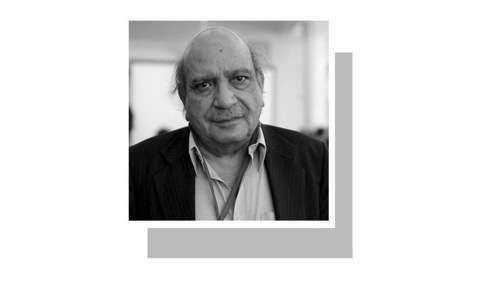LAST week in an interview to a private TV channel, the prime minister made several remarks about what he believed were indicators of moral degradation in Pakistani society, and the underlying reason for an uptick in (reported) gender-based crimes. His analysis placed considerable causal weight on the influence of ‘Westernisation’, midwifed through Bollywood and other foreign influences. The prime minister went as far as to suggest that a similar process, one that can only be summarised as Westernisation through the entertainment industry, had contributed to India becoming the ‘rape capital of the world’.
In the worldview espoused by the prime minister and other social conservatives in this country, the manifestation of such Westernisation is usually apparent through the dissipation of traditional family structures, culminating in high rates of non-married and divorced individuals.
As an aside, it is worth noting that traditional family structures are often invoked as an ideal phenomenon yet rarely defined. It is unclear whether these include just nuclear family units or joint ones or extended tribal and kinship-based collectives. Whatever this vague term is meant to denote (other than definitive patriarchy), it is contrasted against some exaggerated notion of a mass of disconnected individuals, unmoored from familial ties, drowning in a sea of moral decay.
Was Bollywood insidiously at play in decaying American society 200 years ago?
The prime minister’s talking points are not particularly unique to Pakistan as they are not to any other country in any part of the world. You can find similar views among church-family conservatives in the US (such as those represented by the Tea Party movement), among middle-class Anglican Tories in the UK, various stripes of Christian evangelicals in Latin America, and, of course, groups like the RSS in India. This is somewhat ironic because they are being used to juxtapose the inherent stability of non-Western (and Muslim) societies afforded by their traditional family structures, which, as mentioned earlier, allegedly guard against horrific acts of societal, gender-based violence.
What this understanding also belies is a particularly essentialist view of the world, ie a world where particular ideas and cultural symbols — in this case ‘Westernisation’ and ‘liberalism’ — are external impositions that impact human behaviour, including the propensity to engage in wanton acts of violence against women. This is not necessarily wholly incorrect in so far that ideas and cultural and societal norms do matter in shaping violent behaviour, but narrowing it down to one conception or type of culture and its purported growth in Pakistani society is entirely misplaced.
For starters, violence against women and other such acts clubbed together as moral degradation have taken place for centuries, prior to any form of globalisation, and certainly prior to the advent of Bollywood. The same forms of societal violence also took place even when societies such as ours were wholly organised along the lines of ‘traditional family structures’, again whatever these may be. Thus the correlation being drawn by local conservatives does not hold up to scrutiny.
But beyond this obvious flaw in the argument, it is worth exploring another relationship. What if the (still nascent) ideological and cultural value changes causing alarm bells to ring for conservatives in Pakistan are linked to something else? What if they’re linked to transformations in the material basis of society itself?
To illustrate this point, it may be worth looking at a particular chapter from the social history of the US, a country that is usually invoked as an extremity by Pakistani conservatives. Among the first few waves of original settler-colonists to the North American continent were puritans, who fought for reformation in the English church against the moral degradation of 17th-century Catholicism. At the heart of their movement was the salvation and consecration of close-knit family structures, inspired by theological orthodoxy.
These family values and structures were once again at the centre of attention during the First and Second Great Awakenings in the 18th and 19th centuries, when revivalist religious leaders like Charles Finney sought to motivate and mobilise middle-class citizens against perceived moral degradation of society.
Why did the moral fabric and cultural norms of a country, formed by austere puritans committed to social conservatism, repeatedly require saving? Was Bollywood insidiously at play in decaying American society 200 years ago?
The simple answer is these changing cultural norms that were busy inducing panic were driven by changes in the material organisation of society. The 19th century was marked by industrialisation, urbanisation and mass migration. These economic changes heralded changes in the way family structures operated. People had to move out West or North to escape poverty or racial-economic discrimination. Broadly put, they had to leave behind extended kin networks in order to gain some form of socioeconomic mobility.
As expected, such changes induced moral panic and eventually moral transformation. The aforementioned pastor Charles Finney found a considerable following among the older, established citizenry of Rochester, New York, a city that had seen extraordinary population growth because of migrant labour looking to work at its booming wheat-processing industry. For those traditionalists, the influx of often-single job-hunting men, and eventually women, was a source of moral trepidation, at least in part, anchored in status anxieties associated with socioeconomic class (and to a lesser extent, gender).
Pakistan is not 19th-century upstate New York but it already shares with it, as with every other place witnessing economic transformation, the slow breakdown of traditional structures and status quo arrangements. As economic constraints and opportunities set in, joint families will give way to nuclear families, which will make way for individual male migrants, which may eventually make way for greater mobility for women as well. And as long as economic transformation continues, this ‘breakdown’ and cultural transformation will persist. Sometimes change will be stemmed by moral panic, other times by the sheer force of patriarchal violence wielded by traditionalists. But to their persisting chagrin, it will continue.
The writer teaches politics and sociology at Lums.
Twitter: @umairjav
Published in Dawn, October 5th, 2020















































